New Features: Academic paper search and robustness test
CausalAI, a New Method for Exploring Causal Relationships Leading to New Ideas
Data Ethnography™ Advanced Option Plan
to be launched on Thursday, May 18
VELDT Inc.(Head Office: Shibuya-ku, Tokyo; CEO: Jin Nonogami), a CausalAI (Causal Inference AI) solution provider, has developed a high performance option for Data Ethnography™, an agile causal inference platform for R&D, planning, and management departments of companies and public institutions that accelerates the discovery of high-resolution solutions and idea generation through the use of data. The advanced option will be released on Thursday, May 18, and will include an enhanced function for checking the structure of causal relationships inferred from data and virtually verifying the effects of interventions, as well as a robustness evaluation function for checking the robustness of causal relationships discovered, and a function for immediately searching for related papers.
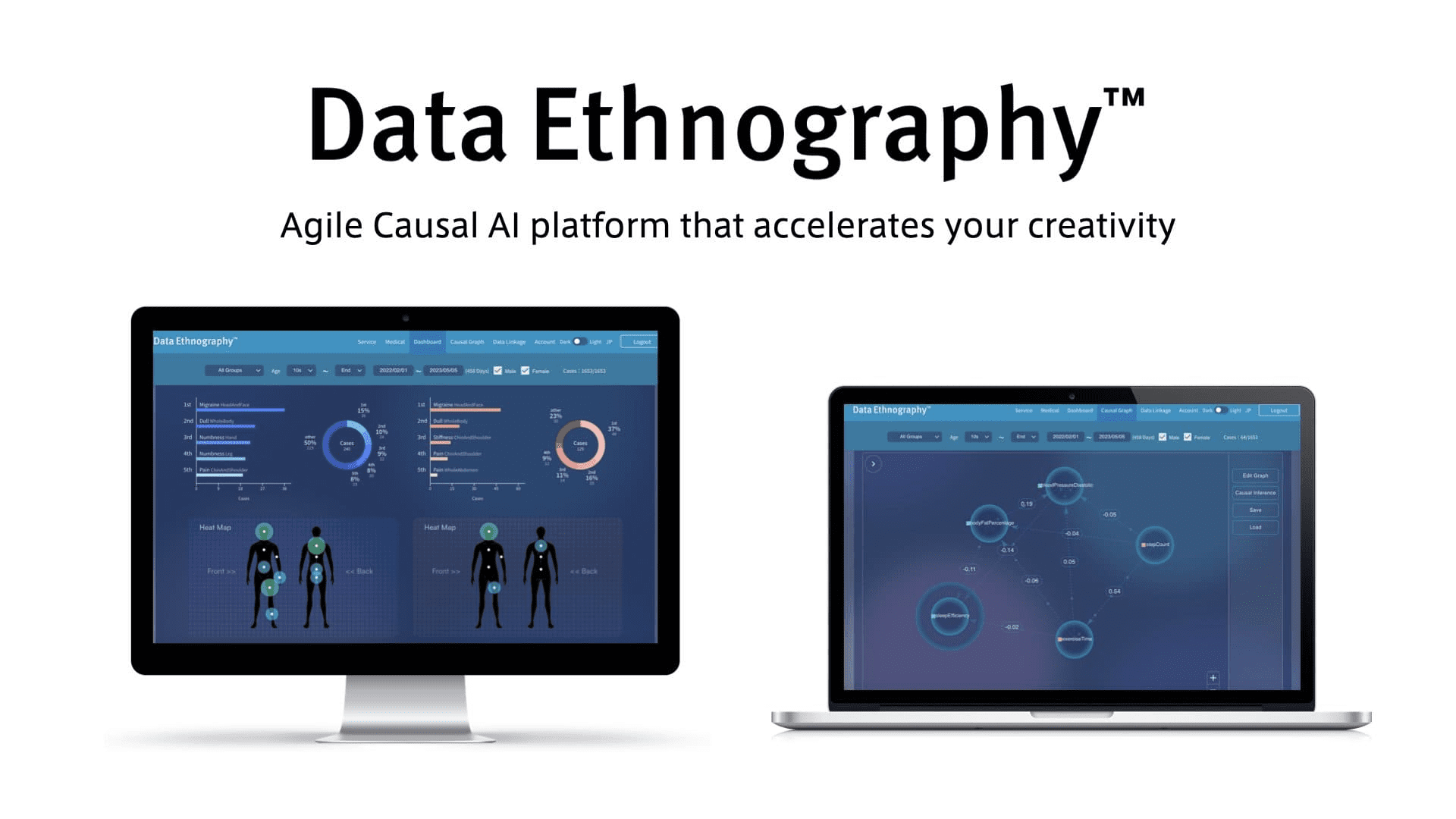
In recent years, companies and public institutions have been promoting digital transformation and the use of AI to improve operational efficiency and productivity. On the other hand, according to our survey, a majority of those surveyed recognize that "data is available, but it is not being utilized" as an issue during the conception phase of projects that require insight and creativity. To solve this problem, we have developed a Causal AI (Causal Inference AI) platform that "assists creativity" through the use of data.
■ Reduce do-overs by virtually verifying causal relationships rather than correlations
In many cases, companies and public organizations search for solutions to problems through a process of hypothesis testing based on correlations between human experience and data. Ultimately, evidence is sought for the effectiveness of the solution, but it must be redone when the correlation is due to chance, or due to other common causes called confounding factors, or when causality cannot actually be proven.
In addition, data validation requires significant preprocessing time to "clean" the data so that it can be used by AI and statistical analysis tools. The time lost and the impact on corporate value when redoing the process repeatedly because significant results are not obtained after time-consuming analysis can be significant.
Data Ethnography™ is a platform that accelerates the discovery of solutions by utilizing data to estimate causal effects in the early stages of a project, and by repeating a trial-and-error process in a virtual hypothesis testing cycle, identifying hypotheses that are likely to lead to success. Data Ethnography™ utilizes our proprietary Smallytics™ algorithm, which calculates the strength of relationships among various combinations of data, taking into account the preconditions for causal relationships. Smallytics™ is resistant to missing data and can be used without time-consuming preprocessing to create clean data required for statistical analysis and AI.
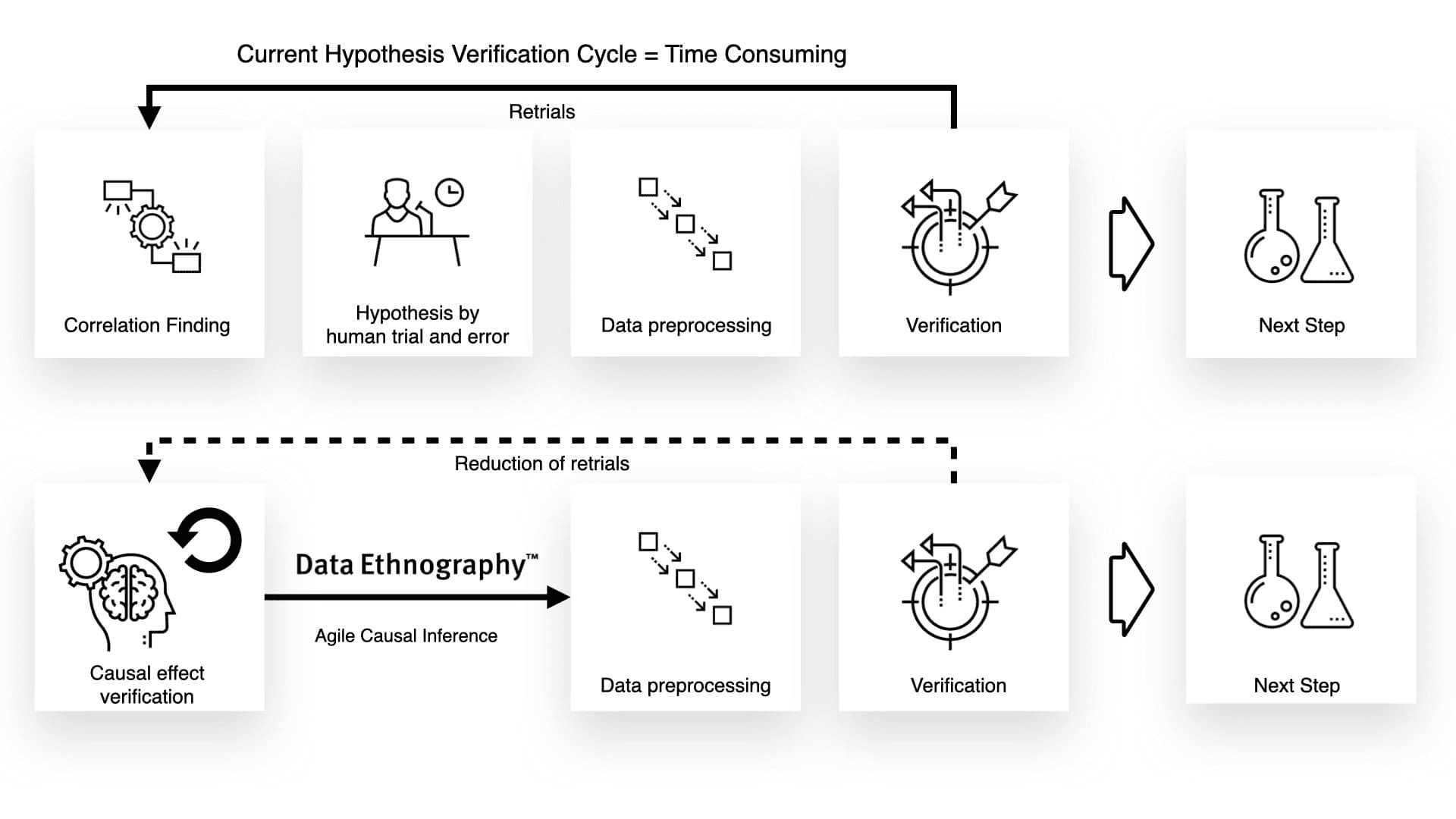
■ How「Data Ethnography™ 」works
Data Ethnography™ utilizes our proprietary Smallytics™ algorithm, which calculates the strength of relationships among various combinations of data, taking into account the preconditions for causal relationships. Smallytics™ is resistant to missing data and can be used without time-consuming preprocessing to create clean data required for statistical analysis and AI.
Data Ethnography™ uses the recommendations of Smallytics™ to narrow down strongly related data items and generates a causal graph with nodes (circles representing data items) and edges (arrow lines indicating the direction of causal relationships). On this causal graph, the user can virtually intervene with the data and predict on the fly how the data to be analyzed, called outcome nodes, will be affected. For example, "How would sleep efficiency change if I doubled my daily stand time?" These questions can be answered quickly.
The conventional approach to estimating the causal structure of a causal graph requires an enormous amount of processing time to calculate all the combinations of data, making it difficult to use easily. Data Ethnography™ uses only the most strongly related data (up to 10 nodes), so a causal graph with a network structure can be generated instantly in a matter of tens of seconds. This allows the user to virtually repeat the effect test with the data and to formulate high-resolution hypotheses.
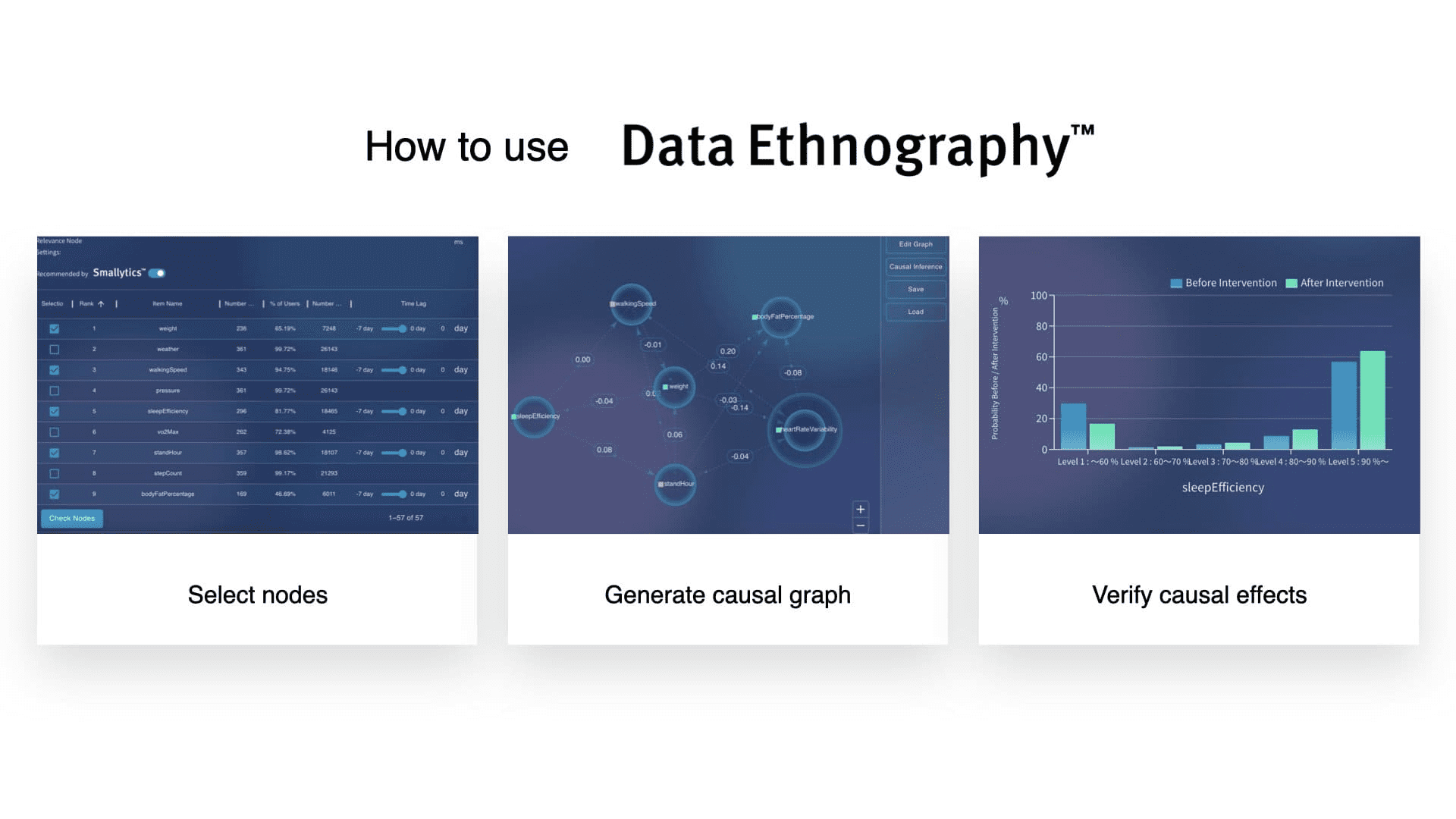
■「Advanced Option」 Search for supporting academic articles and check the reliability of causal effects and advanced analysis.
In addition to the agile causal inference and calculation of intervention effects realized in the Basic Option, the Advanced Option adds a robustness evaluation function to test how reliable the generated model is, and an on-the-fly search function for scientific papers related to the relationships found, allowing the hypothesis derived from the data to be This enables the hypothesis obtained from the data to be verified from a wide range of perspectives. In addition, we have added functions to enhance the analysis of the causal relationships obtained.
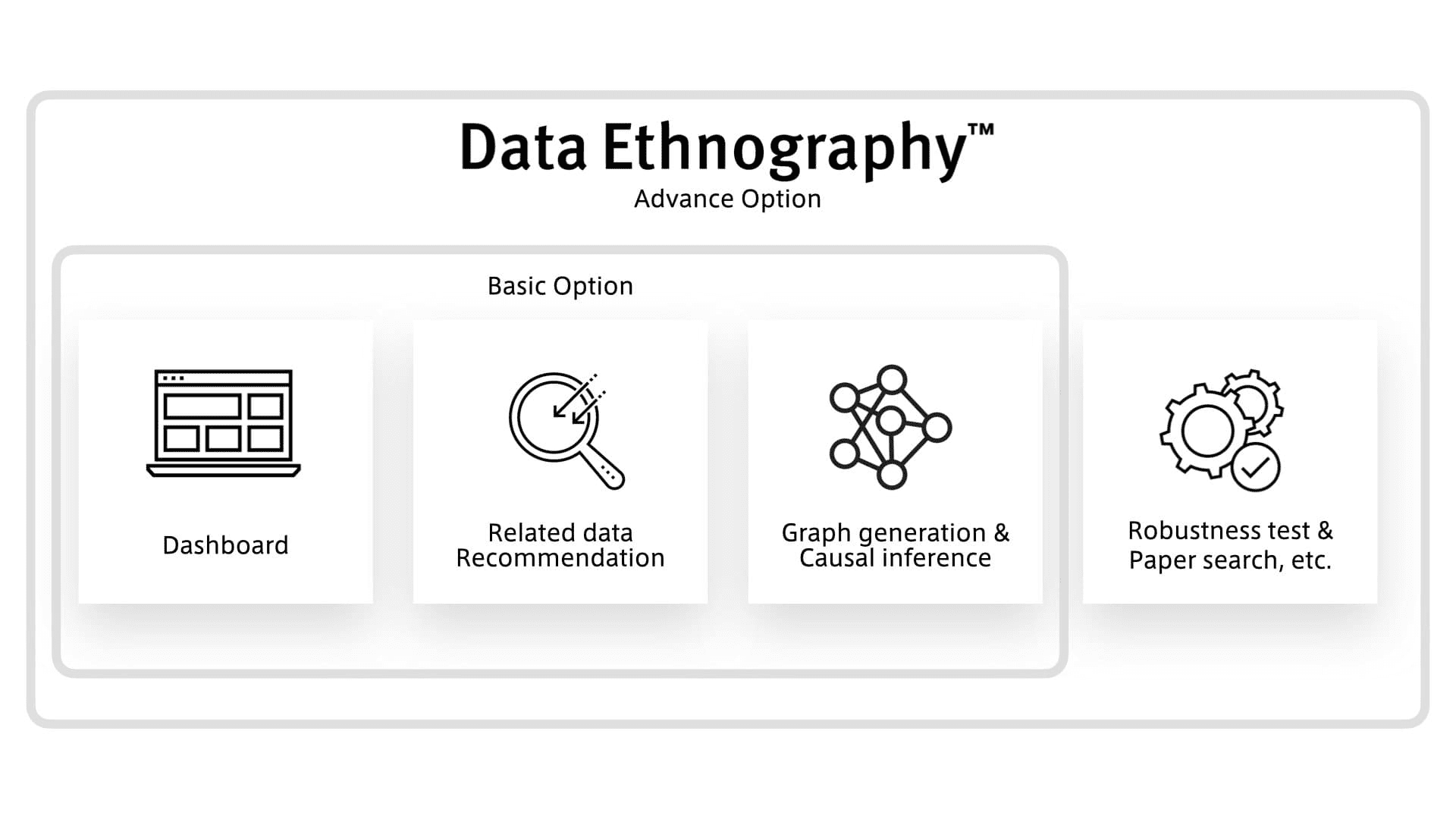
「Causal inferences can be made on mixed data sets of discrete and continuous values」
While the Basic option required the use of discretized data sets, the Advanced option allows causal inference to be applied to data sets with a mixture of continuous and discrete values. Compared to the previous functionality, it is easier to understand because it uses data sets that are closer to the actual distribution and displays the mean treatment effect in actual units. In addition, new functions have been added, such as estimation of natural direct and natural indirect effects.
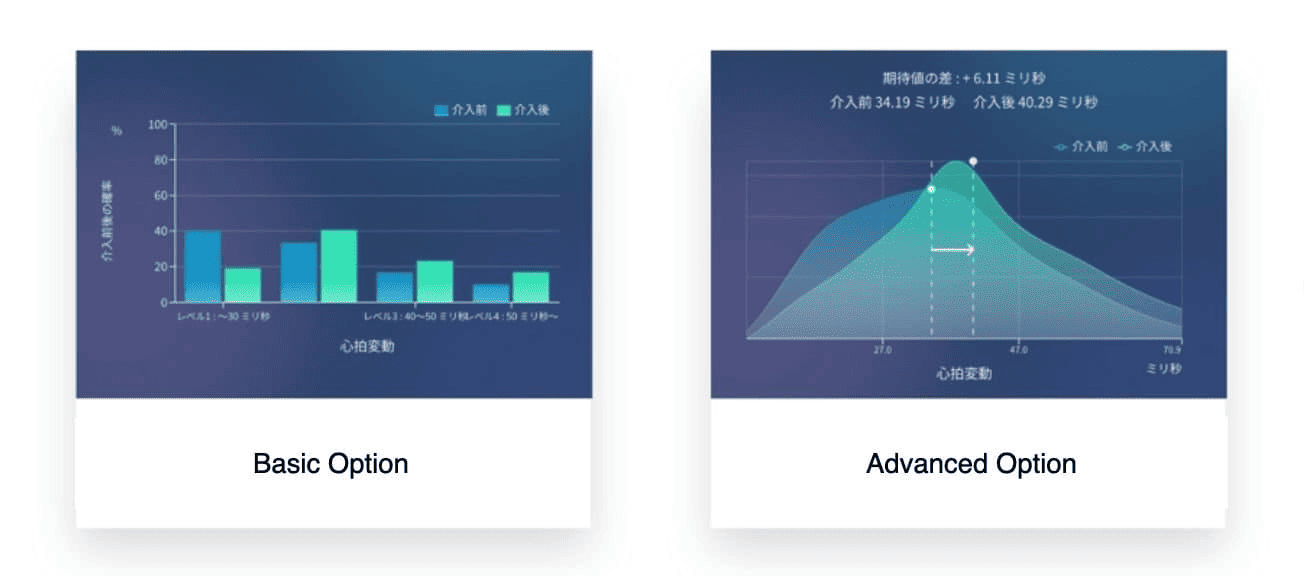
「Added robustness assessment functionality to measure the robustness of cause-and-effects.」
The reliability of the estimated causal effects affects the quality of the analysis. The challenge is that it is difficult to assume that everything in the analysis process is correct, and it is inevitable to employ data sets that represent incomplete distributions or analytical models that poorly describe what is being analyzed. In the advanced option, we have added a robustness evaluation function that applies disturbances to the data set and model to assess the variability of the estimation results. This allows you to know the insufficiency of data and confounding factors, which can lead to the next action.
「Academic article search function utilizing Semantic Scholar」
To ensure that the relationships between the data items found by Data Ethnography™ have academic support, VELDT works with Semantic Scholar, which provides a database of articles, to automatically detect and summarize the articles that are relevant to the results of causal inference. This allows the results of causal inference to be displayed in a reliable manner. This not only increases the reliability of the results of causal inference, but also allows you to efficiently check whether the results have been proven in previous academic studies and to find inspiration for new hypotheses.
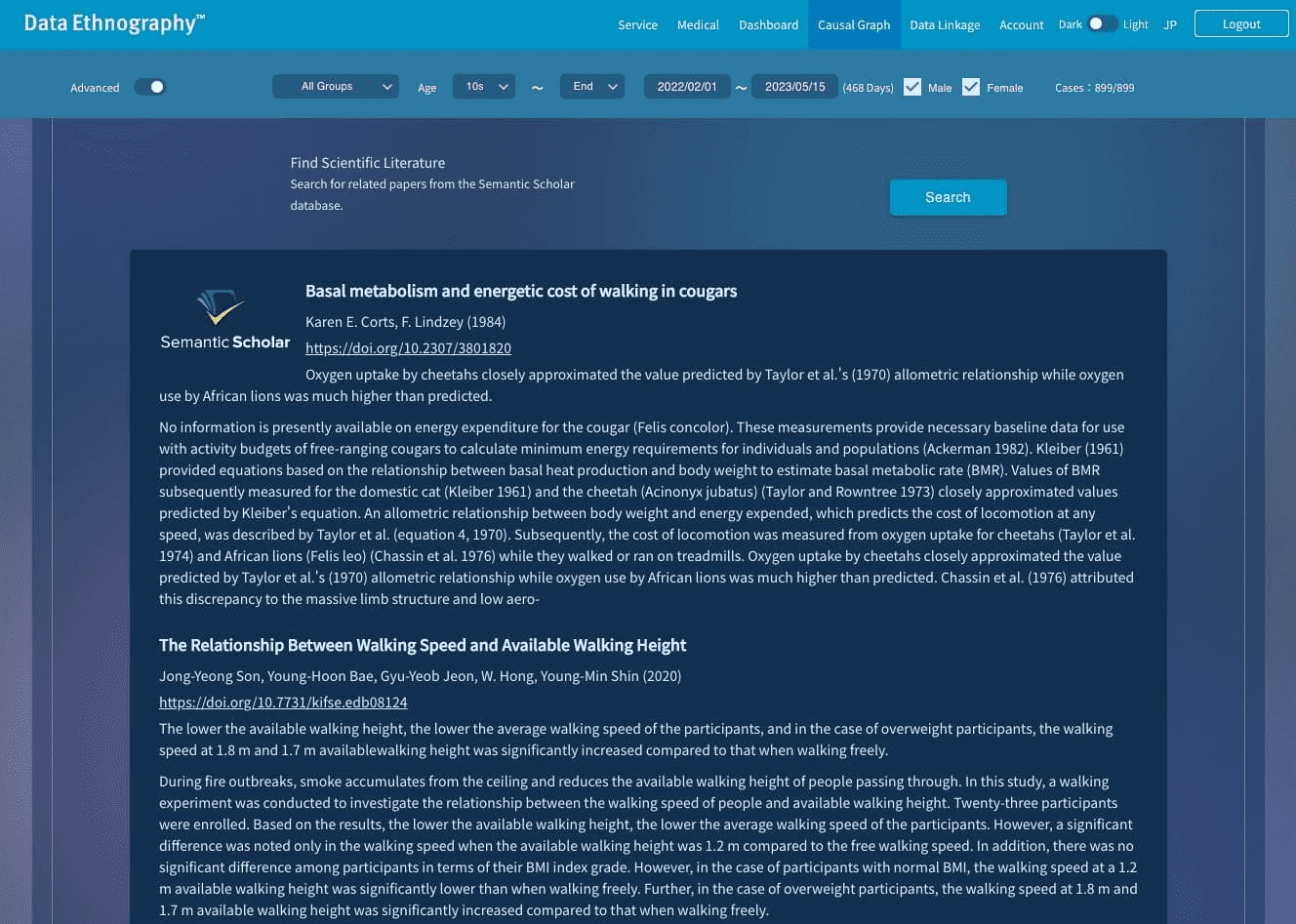
Service site: https://xcausal.com/en/
■「Real World Capturing」ー realizing an AI that is responsible to explain the world as it is
VELDT continues to develop "Real World Capturing" to understand the ever-changing world as it is, rather than a static mirror world constructed from accumulated data. Our goal is to understand the relationships among changing data flows, and to understand the causes and mechanisms related to issues in detail and at high speed. In addition, we are promoting development in the area of Causal AI (causal AI), which adds interpretability and explainability to AI using causal inference, with the aim of achieving "responsible AI".
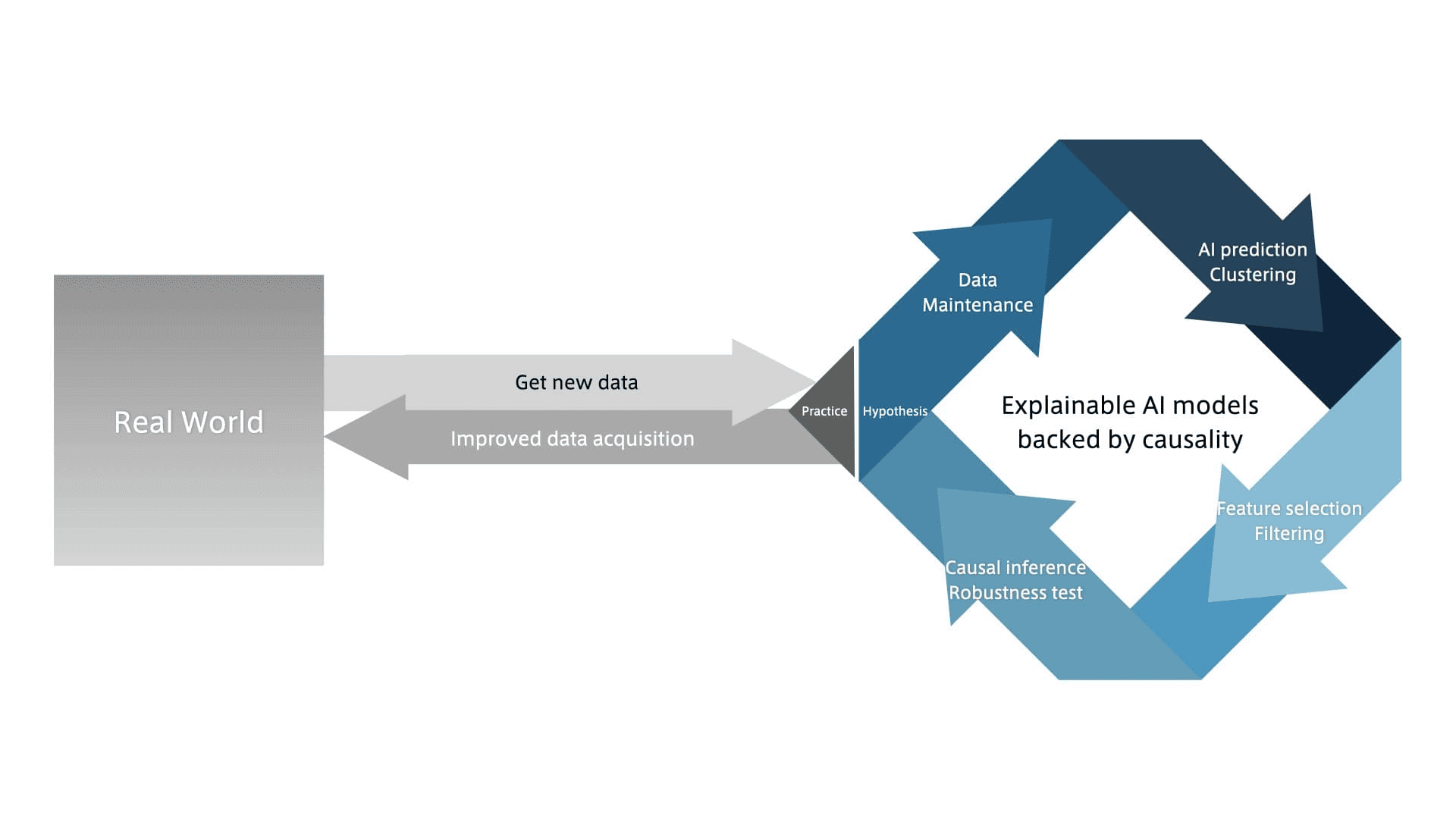
■「Data Ethnography™」Service Menu
Data Ethnography™ for Wellness & Healthcare
Data Ethnography™ offers a fixed fee for wellness and healthcare services. The monthly fee for up to 1,000 users is ¥75,000 for the basic service, including 5 accounts, and ¥30,000 for the basic causal inference option. If upgraded to the newly announced Advanced Option, the monthly fee for the optional price is ¥60,000. In addition, a one-month plan has been added to all services, allowing customers to choose from one-month, six-month, and annual plans.
By linking your company's data with health data based on the user's permission, you can perform ranking related to physical condition and symptoms, trend comparisons, etc.
Data Ethnography™ Custom Options
Data Ethnography™ can be customized for a variety of business and marketing applications. Please feel free to contact us using the form on our website.
■About VELDT Inc.
VELDT is a data science company based in Tokyo and San Francisco that develops data analysis technologies for the real world and society. While technological innovations such as the Internet and AI have brought us convenience, people today face new social and environmental issues as side effects. VELDT's mission is to create a positive spiral for human society and the global environment by innovating the way we interact with technology, rather than simply innovating technology.
- Representative: CEO Jin Nonogami
- Head Office: Jingumae 5-18-10 2-D, Shibuya-ku, Tokyo
- Establish Date: 2012/8/1
- URL: https://veldt.jp/
- For media inquiries regarding this matter, please contact:
- VELDT PR Office (in ANTIL Corporation) Morikawa, Kobe, Hayashi
- TEL: 03-5572-6063
- FAX: 03-6685-5265
- MAIL: veldt_pr@vectorinc.co.jp